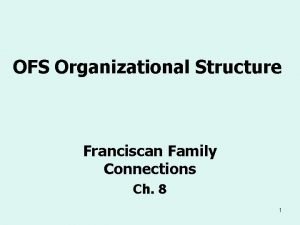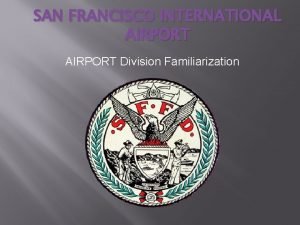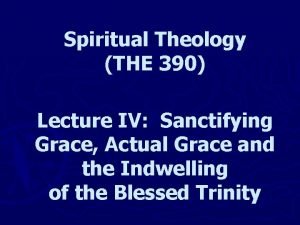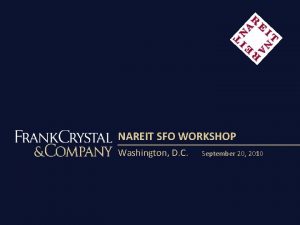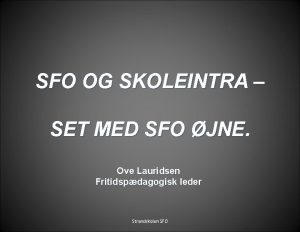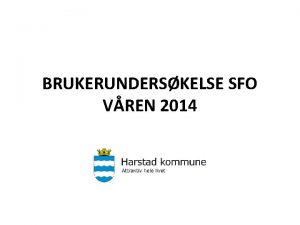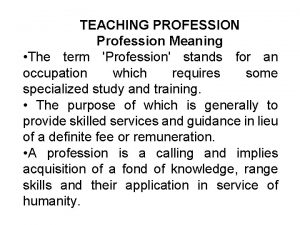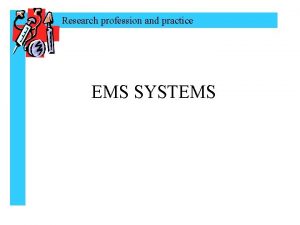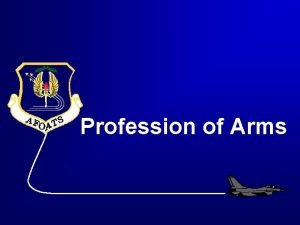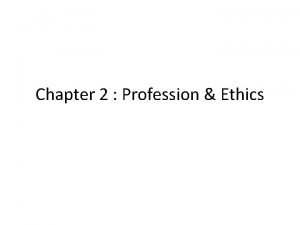PROFESSION IN THE SFO The Grace of Profession
















- Slides: 16

PROFESSION IN THE SFO The Grace of Profession • The Lord grants the Grace of consecrating oneself to the cause of the Kingdom • Profession is a grace and a gift of the Spirit • «The SFO Ritual. . . must conveniently manifest the gift of the Spirit and the commitment for evangelical life proper of the Secular Franciscan Order» . Profession: action of the Church • Profession is simultaneously action of Christ and of the Church • Profession is a solemn ecclesial act (action), and the Ritual declares it by its own nature a public and ecclesial event. • Profession is a salvation event, a kairòs. 1

Profession and Fraternity • The local Fraternity makes the presence and the action of the Church visible in Profession. Therefore «Profession, since by its nature is a public and ecclesial act, must be celebrated in the presence of the Fraternity» (Ritual). • Profession is pronounced before the assembled Fraternity which receives the request of the candidates. In fact, Profession is a gift of the Father who donates new members to the Fraternity. • Profession produces the «incorporation in the Secular Franciscan Order» ; it implies the vital insertion in a family, the Franciscan one, with all the consequences deriving from the fact of belonging to the same spiritual family. The Ritual clearly defines • The liturgical foundation of the Fraternity, which founds itself in reciprocity. Profession establishes a covenant with the brothers and the sisters, we should never fail to honour. The sacrality of Profession, by which we engage in a perpetual commitment with God (Rule 2; Const 42, 2), carries with itself fraternal obligations to be understood and lived in the light of the same «sworn covenant» with God. • The liturgical foundation of the incorporation (belonging) to the Secular Franciscan Order. The incorporation implies the transformation of several individual realities into only one through a process of absorption and assimilation. Concept of “re-founding” of the Fraternity. The minister addresses the new members, saying of the Fraternity: «strengthen our Fraternity in numbers and in virtue by your presence and communion» (Ritual I, 16). 2

The ministries in the celebration of Profession Ministries, exercised by those who take part in the liturgical assembly Candidates The Profession is a priestly act, proper of those who, by virtue of Baptism, have already been inserted in the Church, Priestly Body, and have been conformed to Christ, priest, king and prophet. Relationship of intrinsic connection between the same salvation events Baptism-Confirmation-Profession, whereby Baptism and Confirmation, constitute the fundamental and ineliminable requirements for the existence of the Profession: «You have been made members of the People of God by your Baptism, and strengthened in Confirmation by the new gift of the Spirit, in order to proclaim Christ by your life and your words. Do you wish to bind yourself more closely to the Church. . . » (Ritual). The Minister of the Fraternity «The promise of evangelical life is received by the Minister, in the name of the Church and of the Fraternity. » In the celebration of Profession the minister of the Fraternity exercises a true and proper liturgical ministry and assumes the function of «sign» : he makes visible and manifest the presence and the action of the Church, while the Church itself and the Fraternity receive the Profession through the minister. The priest «The priest presides over this rite as the witness of the Church and of the Franciscan Family» . The event of Profession is of sacramental nature. The witness of the priest is not juridical, but sacramental and of sanctification. The priest in the celebration of Profession is: witness, who attests and manifests the presence and the action of the Church; guarantor, who reassures the Church on the eligibility of the candidates; ratifier, who confirms the promises in the name of the Church. 3

The gift of the Spirit in the celebration of Profession • The celebration of Profession in the Secular Franciscan Order is finalized to the sanctification of those who have been called to follow Christ after the example of Saint Francis of Assisi, remaining in their secular state. • Sanctification is always the work of the Father, but it passes through the mediation of Christ and of the Church, in the Holy Spirit. The mediation of Christ and of the Church, are manifested, above all, through the action of the priest. He is the only one who acts in persona Christi Capitis. Profession and its relation to Eucharist • In the liturgical action of the Profession in the Secular Franciscan Order, the Holy Spirit is invoked, just as He is invoked in the celebration of Eucharist and of the other Sacraments, in religious Profession, in the Consecration of the Virgins, etc. The celebration of Profession is configured, therefore, as epiclesis, by virtue of the ecclesial invocation which requires the gift of grace and the effusion (infunde) of the Holy Spirit on those who have been called to follow Christ in the Franciscan evangelical life. • Profession assumes the significance of a Pentecost, an effective epiphany of the Spirit who consecrates and transforms those who pronounce the promise of evangelical life in the Secular Franciscan Order. 4

• The act of Profession is the manifestation of a specific liturgical ministry and is the priestly action of a person who has been baptized-confirmed, and it takes effect by the presence and the “activating” action of the priest. • Through the priest the Church associates the Profession to the Eucharistic sacrifice: the «Rite of Profession» must «be celebrated during Mass» . • In the context of the Eucharist, the celebration of Profession expresses the intrinsic oblative-sacrificial dimension of the Profession in the Secular Franciscan Order: by making the promise of evangelical life, one puts him/herself at God’s disposal and offers one’s body (the person) on the altar of Christ’s sacrifice as a victim, holy and acceptable to God. • Intimate relationship between Profession and Eucharist: the sacrifice of Christ-Priest who offers Himself to the Father and the sacrifice of the newly professed who offer themselves to the Father are both made sacramentally present at the same time. • Profession is not the act of a moment isolated from the whole life; it is, on the contrary, a commitment of one’s life and for the life. The act of Profession determines a new existential situation, it places in the «state» of professed, which per se is a permanent condition, to be lived in the light of its foundational act originating from the celebration, and intrinsically related to the Eucharist. 5

Baptism and Profession • The adhesion to the Secular Franciscan Order and the Profession, are finalized to «live more intensely and faithfully the grace and consecration of our baptism» (Ritual). • Profession produces particular effects on the Christian, generated by Baptism. Memory of the Baptism • Profession, by its own nature, is a «renewal of consecration and of the baptismal promises» • The Profession in the Secular Franciscan Order has been defined «Memory of the Baptism» . This has to be understood in the biblical sense of «memorial» . Therefore, «making memory» means returning to the Baptism, but also to allow the Sacrament, which initiated a new life, to renew the present life. Implementation of Baptism • • • the Profession of both religious secular Franciscans must be considered an epiphany of the Baptism aimed at a fuller and more fruitful implementation. Profession produces a fruition, a strengthening and an enrichment of Baptism. The Profession acts on the Baptism, and develops it, it generates a novelty and produces a new effusion of the Spirit. 6

The relationship with the Church • From the Profession comes a new relationship with the Church, or better, the fundamental baptismal relationship, already renewed and perfected with the Confirmation, becomes «stronger» and «closer» . Witnesses and instruments of the mission of the Church • «They have been made living members of the Church by being buried and raised with Christ in baptism; they have been united more intimately with the Church by profession. Therefore, they should go forth as witnesses and instruments of her mission among all people, proclaiming Christ by their life and words» . «Called like Saint Francis to rebuild the Church and inspired by his example, let them devote themselves energetically to living in full communion with the pope, bishops, and priests, fostering an open and trusting dialogue of apostolic effectiveness and creativity » . (Rule 6) • The mission of secular Franciscans is not defined by specific activities to perform, but by their “being”. • The purpose of the Rule, of the Constitutions and of the Ritual is to underline the necessity of an authentic ecclesial life, consistent with the stronger and closer bond that secular Franciscans, have contracted with the Church, by way of the Profession. This is most of all a bond of communion; this is the basic element which must be strongly emphasized, at the concrete existential level, in everyday life. • The Mission of secular Franciscans is intrinsically finalized to building the Church. Francis and his followers have received from the Lord the gift of immersing themselves in the vital tissue of God’s People, to enable it to stand over the world and live in it as «universal sacrament of salvation» . 7

Consecration … as the Lord has granted me this grace, I renew my baptismal promises and consacrates myself to the service of His Kingdom» (Ritual) • The Profession is the act with which a person puts him/herself in the hands of God and lets Him take over, with the consequence that from the very moment of the Profession this person no longer belong to him/herself, but considers to be fully taken, as expropriated, in the full, total, and unconditioned availability of the entire self to God. By virtue of the Profession we become God’s property, and therefore «sacred» . • The project we become totally dedicated to with our Profession in the Secular Franciscan Order, is God’s project, and the consequences deriving from our consecration refer to the union with God, adhesion to His salvation plan, the service of the Kingdom by living in the world and for the world. • The project of life, delineated by the Rule and the Constitutions, centers on the commitment to live, for the entire life, the Gospel in the manner of St. Francis, remaining in the secular vocation. 8

Profession - The value of Profession in the SFO • By the term Profession we normally mean the act by which a baptized embraces publicly and permanently the state of perfection in conformity to the evangelical counsels by pronouncing the three vows of chastity, poverty and obedience (profession of vows), and becoming the member of an Order or a religious Congregation. • The term profession is also applied to the different «states of life» and to the different categories of Christians, whether they are, or not, specially consecrated. The term profession is also applied to the «state of public penitents» ; this is particularly significant in relation to the Order of Penance. • In the Rule, in the Constitutions and in the Ritual of the Secular Franciscan Order the Profession sanctions the commitment, assumed before God and the Church, to observe the Gospel in the manner of St. Francis, by lay persons (married and unmarried) and by members of the secular clergy, who, normally are not bound by vows of obedience, poverty and chastity, and intend to live in the common conditions of the secular state. 9

The primitive legislation of the Franciscan Third Order and the basic elements of the Profession of the Brothers and Sisters of Penance as compared with today’s Secular Franciscans. • Effects of Profession a) An obligation contracted directly with God; b) The commitment to observe a form of life, or Rule; c) The definitive incorporation into the Order. At the end of the year of probation, the promise sanctioned the definitive canonical entry in the Fraternity, and it was not possible to leave the Fraternity except in the case of entering into another approved “religious” Order. • The promise of the Brothers and Sisters of Penance represented then, and it still does, a true and proper Profession. This is vigorously and clearly manifested in the Pauline Rule, in the General Constitutions, and in the Ritual, this latter also approved by the Congregation of Sacraments and for the Divine Cult. • The specific character of Profession does not consist sic et simpliciter in the vows of obedience, poverty and chastity. There is not such a thing as a Profession tout court, but a Profession in a specific religious institution, which can be “religious” in the strict sense (Institute of Consecrated Life) or secular and/or lay. Therefore, Profession in the Secular Franciscan Order has the dignity of a true and proper solemn and religious commitment entered with God and with the Church, which cannot be considered of lesser importance with respect to the one entered by the “religious”. 10

VALUE OF PROFESSION CONCLUSIONS • The Church, by approving with its apostolic authority the fundamental legislation of the Franciscan Third Order, in the course of history, has always recognized and confirmed the value and the essence of the Profession in the Secular Franciscan Fraternity. • The Secular Franciscan Order is a “Lay Order”, a true Order, Ordo veri nominis” which represents “a school of integral Christian perfection”, just as any other Religious Institute. • In this “true Order” a “true Profession” is celebrated. This Profession, though differing in its contents (the vows), from the one of the, strictly speaking, Religious Institutes, has an equal dignity. 11

IN THE MANNER OF SAINT FRANCIS • Living the Gospel in the manner of Saint Francis and by means of this Rule approved by the Church (Rule 2; Gen. Const. 1, 3; 8, 1) • Therefore for those who bind themselves by the Profession in the Secular Franciscan Order to «reach the perfection of love in their secular state» (Rule 2), the reference to Francis, to the Rule and the Constitutions, is not optional, but paradigmatic and binding. • The intention of St. Francis was simply to return to the Gospel of Jesus Christ. Therefore, every Franciscan vocation is an evangelical-franciscan vocation. Franciscans must imitate Francis and, like him, they must not have any other Rule or life than the one of the Gospel of Jesus Christ, because at the origin of our vocation we find the mediation of Francis. • More than a Rule, we should speak of “life”, fully assuming St. Francis concept for whom, the life is to observe the Gospel of our Lord Jesus Christ. • «The Rule and the life of secular Franciscans is this: to observe the Gospel of our Lord Jesus Christ, by following the example of St. Francis of Assisi» (Rule 4). 12

The evangelical life to follow Christ Following to be conformed to Him “Many men and women, married and single, and many members of the diocesan clergy are called by God to follow the way of perfection of the gospel life after the example and manner of Francis of Assisi … promise to follow Jesus Christ and to live the gospel in fraternity by entering the Secular Franciscan Order. ” (Ritual). The sequela Christi depends on the observance of the Gospel. For Francis, following Christ does not mean to re-propose facts and gestures of the earthly life of the Lord, but rather to orient one’s life on all the evangelical demands by sharing and imitating the God, who has emptied Himself all the way to death on a cross for the salvation of the world. Francis had a dominant thought, an insuppressible desire, a constant intention: that of a selfformation oriented to conformation. The “following” for the sake of love, in fact, has no other goal than «christification» and it is completely finalized to transform the lover into the image of the loved one (LM XIII, 2; FF 1224). Francis was therefore «completely taken by Jesus. He carried Jesus in his heart, Jesus on his lips, Jesus in the ears, Jesus in the eyes, Jesus in the hands, Jesus in all the other members. . . » (1 Cel 115; FF 522). In so doing Francis reaches the full conformation to Christ. 13

Christ, book of life • Saint Francis of Assisi «made Christ the inspiration and the centre of his life with God and people» . • This is an implicit exhortation to those who pronounce their Profession in the Secular Franciscan Order, to do the same. • In conclusion, for the Secular Franciscans following Christ and conforming to Him means to implement the commitment of Profession to observe the Gospel in the manner of St. Francis by living all the demands of the Gospel to the very end, usque in finem, including death, thus opening oneself to the promises proclaimed in the Gospel itself. 14

Profession in the SFO and Evangelical Counsels • Secular Franciscans do not pronounce vows, however, in developing the project of life of the secular Franciscans, the Rule and the Constitutions propose to them the ascetic way of the “evangelical counsels” to be obedient, poor and open to love to fulfill the commitment of living according to the form of the Holy Gospel. • “Holiness of the Church is greatly favoured by multiple counsels, which the Lord proposes to his disciples to observe in the Gospel” (LG 42 c) Multiplicity of counsels, which, therefore cannot be restrictively identified with just the three counsels professed by the religious with their vows. All the disciples of the Lord, in fact, are called to perfect charity. The evangelical counsels find their natural context within the «commandment» , within the unlimited spaces of Love. • The necessity of living the evangelical counsels has its foundation in the total availability that also the Christian secular life demands. Availability, as an interior attitude, already carries with itself the spirit and the deepest content of virginity, poverty and obedience. It presupposes, and it actually consists, in loving Christ more than oneself and above all other persons and goods, always, in every moment of one’s life. 15

Secularity The Ritual (PN 14 a, d) of the Secular Franciscan order expressly speaks of «a consecration that is to be lived in the world» and of “the desire to live in the world and for the world”. The Rule identifies the domain where the Brothers and the Sisters of the SFO, led by the Spirit, strive for perfect charity : in their own secular state (Rule 2). Secularity and world are, therefore, the two essential coordinates to understand the specific identity of the members of the Secular Franciscan Order and their particular mission that stems from the Profession. Theological dimension of secularity: secularity derives from the acceptance of God’s intervention in human history and of its unfolding, and expresses itself as the recognition of a world (saeculum) where the Spirit is at work for the «recapitulation» of all things in Christ. «Secular state consecrated to God» : consecrated in the world for the world, the task of lay Franciscans is to consecrate the world fully immersing themselves in it. By living their consecration to God in the world and for the world, and by «imbuing their earthly affairs with a genuine gospel spirit» (Ritual, III. 46), secular Franciscans bring witness to the fact that the sanctification of the world passes necessarily through the sanctification of man, because this world can be transformed only by the spirit of the Beatitudes. ( LG 31). 16
 Sfo atm
Sfo atm Nafra sfo
Nafra sfo Sffd h2
Sffd h2 Skolelederkonferansen 2021
Skolelederkonferansen 2021 Shouts of grace
Shouts of grace Once in grace always in grace
Once in grace always in grace Actual grace and sanctifying grace
Actual grace and sanctifying grace đại từ thay thế
đại từ thay thế Tư thế worm breton là gì
Tư thế worm breton là gì Thế nào là mạng điện lắp đặt kiểu nổi
Thế nào là mạng điện lắp đặt kiểu nổi Quá trình desamine hóa có thể tạo ra
Quá trình desamine hóa có thể tạo ra Công của trọng lực
Công của trọng lực Dạng đột biến một nhiễm là
Dạng đột biến một nhiễm là Vẽ hình chiếu đứng bằng cạnh của vật thể
Vẽ hình chiếu đứng bằng cạnh của vật thể Thế nào là sự mỏi cơ
Thế nào là sự mỏi cơ Bổ thể
Bổ thể Phản ứng thế ankan
Phản ứng thế ankan

